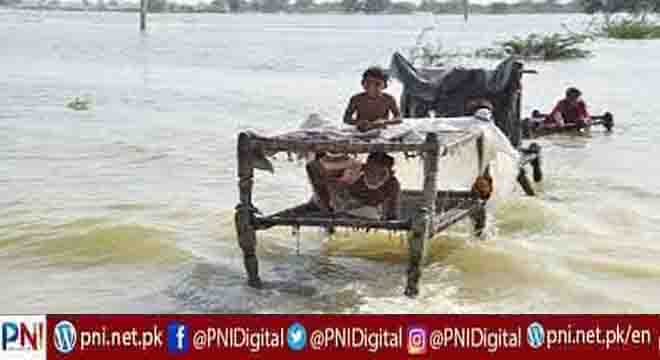ISLAMABAD, Oct 27 (APP): United Nations led organizations on Thursday updated about the launch of the revised Pakistan Floods Response Plan (FRP), appealing to the world to come forth as about 100 days passed since the first appeal, and people still need lifesaving assistance in the flood-hit areas of Pakistan.
In a joint press conference with United Nations Populations Fund Deputy Representative Latika Maskey Pardhan, Humanitarian Affairs Officer (OCHA) Felix Omunu, UN Humanitarian Coordinator in Pakistan Julien Harneis, and National Humanitarian Network (NHN) representative Sumaira Javed, they urged the international world to review the revised plan ahead of second wave emerging in post-flood hit area of Pakistan.
They noted that 2022 was the year the world realized climate change was here as 33 million people were affected, 1,718 killed, and 12,800 injured. Climate change events damaged 2.1 million houses, and displaced 8 million people, including 644,000 living in relief camps, while 13,000 km of roads were damaged and 1.2 million livestock was lost.
Populations Fund Deputy Representative Latika Maskey Pardhan said women and children in the flood-hit areas of Pakistan needed urgent health and protection services amid the epic flood disaster.
Malnourished pregnant women are also at risk of giving birth to low birth weight babies who will be malnourished, she said, adding that around 650,000 pregnant women in flood-affected areas were facing challenges in getting access to maternal services, and more than 73,000 women were due to give birth in the next month — in the throes of the crisis.
She said children were facing a nutrition emergency that was threatening the lives of millions of children — more than 1 in 9 children in flood-affected areas of Pakistan suffering from severe acute malnutrition. As winter was approaching, there was an upward trend in acute respiratory diseases, with children being affected the most; an average of 24% of reported cases were Acute Respiratory Infections with 1/3rd of children, she added.
NHN representative Sumaira Javed said there was an increase in gender-based violence (GBV), especially in Southern Punjab. “Women and children are at risk in camps and settlements. Girls may also face increased risks of child marriage as families who have lost their livelihoods struggle to make ends meet.”
In response to the increased cases of GBV, she informed, legal assistance, PSS, medical, safety, and security were provided for nearly 34,000 people in Sindh, Punjab, and Balochistan. Moreover, she added, PSEA awareness raising reached some 11,000 people in Khyber and Sindh while similar activities for GBV awareness raising reached over 6000 people in Khyber Pakhtunkhwa and Balochistan.
Resident Humanitarian Coordinator Julien Harneis briefed that funding for food assistance may finish by the end of the year if more funds were not received. “An estimated 14.6 million people require emergency food assistance from December through March 2023, representing an increase of more than 100 percent of the pre-flood estimate. This
includes 4 million people in IPC Phase 4 (emergency).”
Similarly, he added, 12 million people need shelter. “The shelter is becoming more and more important as people return home and winter sets in.”
He said the provision of health facilities in the flood-affected areas had become very important as about 8.2 million people need health assistance. Besides the challenges posed by the acute respiratory diseases, malaria and dengue outbreaks, lack of maternal services for more than 650,000 pregnant women, and immediate life-saving support for almost 10 million children needed to be addressed on a priority basis, he added.
Appealing the world to increase donations to support relief and rehabilitation activities in the flood-hit areas of Pakistan, Harneis said the FRP was released in the first week of October, appealing for US$816 million to cover the most urgent needs of 9.5 million people in need. “However,” he reckoned, “more funding is urgently needed to cover the growing humanitarian needs.”
Follow the PNI Facebook page for the latest news and updates.









